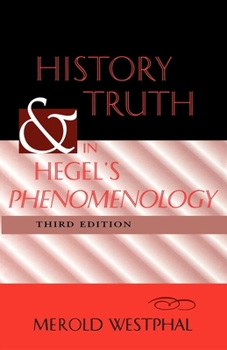History and Truth in Hegel's Phenomenology, Third Edition
Select Format
Select Condition 
Book Overview
"This fairly small book must take its place as the best introductory study of Hegel's Phenomenology available." --Philosophy and Phenomenological Research
"Westphal's book is a comprehensive guide to the argument of the entire phenomenology. . . . will repay close study by serious undergraduate and graduate students of philosophy." --Choice
This detailed interpretation of Hegel's Phenomenology of Spirit seeks to show that the unity...
Format:Paperback
Language:English
ISBN:0253212219
ISBN13:9780253212214
Release Date:September 1998
Publisher:Indiana University Press
Length:256 Pages
Weight:0.75 lbs.
Dimensions:0.8" x 5.5" x 8.5"
Customer Reviews
1 rating
Uneven handling of difficult material
Published by Thriftbooks.com User , 23 years ago
Not much detail is presented in Westphal's book, nor are the contours of dialectical development laid out very clearly. A basic outline of the Phenomenology is followed, but without much attention to the crucial transitions between dialectical stages. The section on consciousness, (i.e. sense experience, perception, and understanding), is adequate; the section on self-consciousness, (i.e. master-slave, unhappy consciouness), is the weakest and murkiest.Probably, the best section concerns the latter stages of spiritual progression, (i.e. religion, absolute knowledge). Westphal discusses developments here in a general context of Christian theology, showing how Christian themes are taken up and reproduced in philosophical terms. A traditional issue arises at this point: Has Hegel abandoned phenomenology (description) for Christian metaphysics (transcendancy). The author presents a thoroughly secularized interpretation of of spirit's fulfillment and Absolute Knowledge. Spirit's ultimate return to itself transpires on the this side of the temporal divide instead of the transcendent side. It's an historical and temporal event in which spirit recognizes itself in others in a mutual display of love and recognition. It's not a transcendent occurrence in which exteriority is somehow overcome. Just how this mutual recognition also includes recognition of nature as its own ontological creation is not clear to me from Westphal's text; yet some such must be present if Absolute Knowledge is to truly take place.In the author's opinion, Hegel's error lies not in a departure from the phenomenological method, since correctly understood in its secularized interpretation, no metaphysics is involved. Rather, Hegel's error lies in the naive belief that this final spiritual stage of description was actually being realized in 19th century Prussia! In short, his mistake was not philosophical but historical. Westphal's reading of Hegel works fine as an interpretation congenial to modern secular readers.





